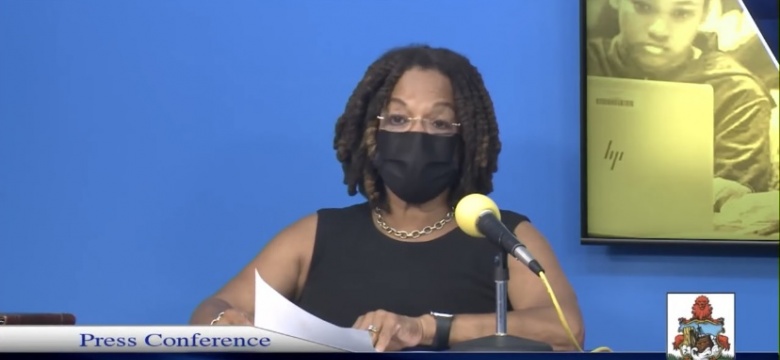
Good morning.
Some parents have raised concerns regarding the mask-wearing policy for students while in school. Some feel that our coronavirus testing in schools is sufficient to ensure the safety of our students and staff, and they are requesting that children be allowed to remove their masks while sitting at their desks.
Unfortunately, testing alone will not protect students, teachers and staff, and removing their masks while sitting could increase transmission.
I want to remind members of the public that there is a difference between detecting the coronavirus and preventing the spread of coronavirus.
Testing for the coronavirus is designed for early detection, not prevention. Wearing a mask while indoors is an essential layer of protection to prevent the spread. Again, there is a distinct difference between detection vs prevention.
As children head back to the classroom, in the middle of a serious outbreak, the Ministry of Health is working closely with the Ministry of Education to protect the health and safety of the students, teachers and staff in all of our islands schools, and we are using multiple layers to provide the greatest level of protection.
Our layered approach is similar to wearing a hat, scarf, gloves and a warm coat in freezing weather – each layer provides an added level of protection from the cold.
The pandemic is far from over, and while the vaccine is the most effective protection available, masks, when worn correctly, effectively reduce the spread of the coronavirus in schools.
To avoid scenarios where classes go remote just as the school year begins, as I said earlier, our approach to keeping our children, teachers, and staff safe from the coronavirus is a layered approach, which includes the following.
·Encouraging all eligible teachers and students to be fully vaccinated
·Encouraging all families to participate in the saliva screening programme
·Maintaining appropriate physical distancing - at least three feet between students within classrooms
·Avoiding poorly ventilated areas
·Frequent hand-washing
·Covering a cough or sneeze
·Cleaning and disinfecting touchpoints
·And, of course, consistent and correct mask use inside our schools, regardless of vaccination status.
Masks significantly protect both the persons who are wearing them and the people around them. Wearing a mask will also help decrease the number of symptomatic respiratory illnesses that children have.
This is especially important for students as:
·Children under 12 are unvaccinated,
·Children have been involved in the start of the present outbreak driven by the delta variant which now has over 200 positive cases, and,
·Infected children can take the virus “home” to unvaccinated friends and relatives.
Over the summer, we had four (4) camps and childcare settings affected with positive cases, mostly the delta variant which is highly transmissible. In quite a few instances, these children went home and unknowingly passed the infection to someone else in their household, and, subsequently, this led to positive cases in workplace settings as well.
Similar clusters of cases in schools can occur if protocols are not followed, such as mask-wearing.
The Government of Bermuda is taking a cautious approach, which is prudent at the start of the school year, given that we are currently meeting the criteria for community transmission at concerning levels.
Again, the main goal of these prevention measures is to protect students, teachers and staff, and provide a safe learning environment, in support of the Ministry of Education’s mission to start in-person learning, as this is best for our students.
I cannot stress enough that our children’s well-being and safety is our main priority.
We believe that our prevention strategies, if strictly adhered to, can maintain in-person learning, even during high transmission levels in our community.
As a community, we all want what is best for our children, and in-school learning is certainly the desired objective.
In closing, I remind all teachers, staff and children that they must stay home if they feel unwell or have symptoms.
Symptoms, which can easily be associated with allergies or a mild cold, are possible coronavirus symptoms. This includes sore throat, stuffiness, tiredness, headaches, and coughing and sneezing.
If you have questions or feel unwell, please call the COVID helpline 444-2498 or visit gov.bm/coronavirus.
Thank you.
